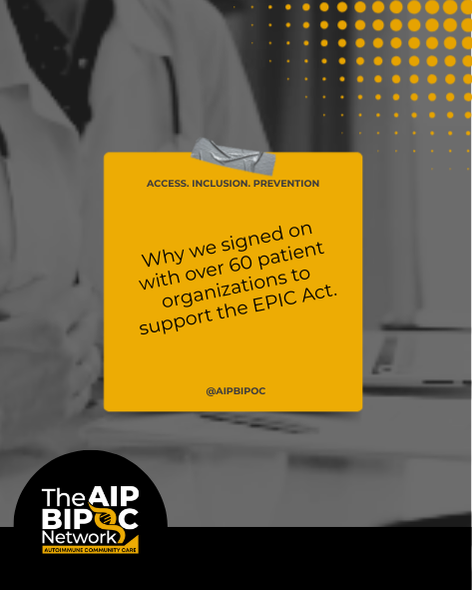Imagine finding a medication that finally works – one that helps manage symptoms, reduce flares, and restore stability. Now imagine losing access to that medication, not because it’s unsafe or unavailable, but because a policy discouraged its development in the first place.
That’s the concern behind a growing issue in federal healthcare policy, one that could jeopardize access to small molecule drugs for people living with autoimmune disease and chronic illness.
What’s the EPIC Act—and What’s the Problem?
The EPIC Act (Ensuring Pathways to Innovative Cures) is a bipartisan bill introduced to fix a flaw in the Medicare Drug Price Negotiation Program (MDPNP). Created by the Inflation Reduction Act (IRA) of 2022, this program allows Medicare to negotiate prescription drug prices after a certain number of years post-FDA approval.
But here’s the issue:
- Small molecule drugs (pills, capsules, etc.) are eligible for negotiation after 7 years
- Biologics (complex medications often administered by infusion) aren’t eligible until 11 years
This 4-year gap is already influencing how pharmaceutical companies decide where to invest their research. The result? Reduced development of small molecule drugs, which are often more affordable, easier to access, and more manageable for individuals to use at home.
Why It Matters for Autoimmune and Chronic Illness Communities
Small molecule drugs play a vital role in the care of individuals living with chronic and autoimmune conditions. These medications support independence and allow many people to manage symptoms without needing infusion centers, injections, or additional time off work and caregiving responsibilities.
When investment in these drugs declines, so do the options for patients, especially for common chronic illnesses like hypertension, gastrointestinal disorders, and inflammatory diseases. That loss of access can mean:
- Higher out-of-pocket costs
- Greater reliance on biologics and in-office treatments
- Widening health disparities for underserved communities
For Black, Indigenous, and other communities of color, who already face barriers to diagnosis, treatment access, and culturally responsive care, this adds another layer to an already difficult landscape.
Why We Took a Stand

The AIP BIPOC Network joined over 60 national and state organizations in calling on Congress to eliminate the disparity in MDPNP timelines by supporting the EPIC Act. We also support the Executive Order signed in April 2025, which calls on lawmakers to fix what’s being called the “pill penalty.”
Access to treatment shouldn’t be based on the type of medication, it should be based on what works best for the patient. Giving both small molecule and biologic drugs the same fair opportunity for development and use is key to making care more affordable, more equitable, and more innovative.
Take Action
Healthcare policy doesn’t always make headlines, but its impact is deeply personal. When legislation affects the development of medications many of us rely on, we can’t afford to stay silent. Here’s what you can do:
🟡 Read the EACH/PIC Letter
See why The AIP BIPOC Network and over 60 other organizations are calling on Congress to protect access to small molecule drugs.
🔗 Download the EACH/PIC Letter
🟡 Join Our Online Community
The AIP BIPOC Community (ABC) is a space for connection, education, and collective action for those navigating autoimmune and chronic illness.
🔗 Join the ABC Community
🟡 Call, Email, or Tag Your Lawmakers
Ask Congress to support the EPIC Act (S.832/H.R.1492) and fix the “pill penalty” that threatens access to affordable medications.
🔗 Find your representatives
🟡 Raise Awareness
Share this blog and trusted resources with your network. Most people don’t know how policies like this impact medication access until it’s too late.
🟡 Get Involved and Support Advocacy
Support organizations like The AIP BIPOC Network working to ensure equitable drug access. Whether you donate, share, or get involved, your support matters.
🔗 Donate to The AIP BIPOC Network
🟡 Support Each Other Locally
Talk to your community. Share resources. Help someone appeal insurance denials or understand upcoming changes. Community care is powerful.
🟡 Correct the Narrative
Push back when policies are framed as cost-saving “fixes” without naming the harm to patients. This isn’t about convenience, it’s about access and dignity.
🟡 Stay Ready and Informed
Policy shifts happen fast. Stay connected with advocacy organizations so you’re ready to act when it counts most.
Final Thoughts
When we talk about access, we’re not just talking about insurance coverage or pharmacy shelves. We’re talking about dignity. About the ability to live fully and manage illness with tools that meet people where they are.
Policies that discourage innovation in small molecule drugs ultimately hurt patient, especially those already facing barriers due to race, income, geography, or chronic illness stigma.
Equity in care means equity in treatment development. It means ensuring that life-changing medications are not only created but remain accessible to the people who need them most.
Let’s keep pushing for policies that reflect that.
Jamie Nicole is the Founder and CEO of The AIP BIPOC Network. She is a Certified AIP Coach, patient advocate, and fitness instructor living with multiple autoimmune conditions. Jamie is committed to advancing equity, access, and representation for Black, Indigenous, and People of Color navigating autoimmune and chronic illness. Through education, advocacy, movement, and community-driven initiatives, she works to ensure BIPOC voices are centered in healthcare conversations and solutions.
© 2025 The AIP BIPOC Network, INc | EIN # 92-2526059 | all rights reserved | legal
